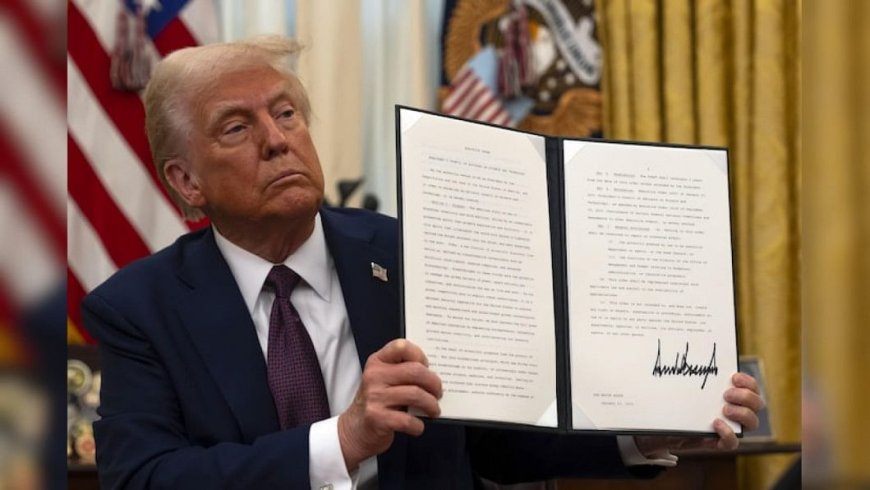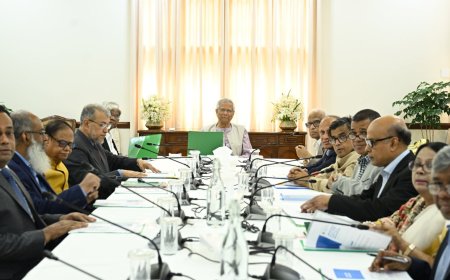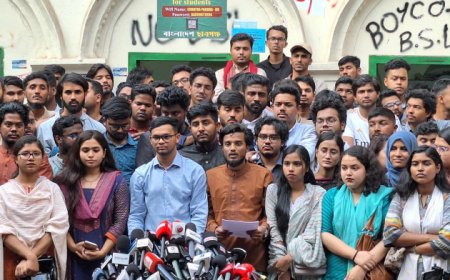US funding freeze impacts development projects in Bangladesh
Thousands of Bangladeshi development professionals face uncertainty as US government-funded projects were suspended following an executive order by the Trump administration on January 20.

US Funding Freeze Puts Bangladesh’s Development Sector in Crisis
Thousands of Bangladeshi development professionals face uncertainty as US government-funded projects have been suspended following an executive order issued by the Trump administration on January 20.
Although the order mandates a 90-day review, many employees have already been laid off, and project activities have come to a complete halt. The USAID website has gone offline, and project personnel have been advised to avoid office visits. In some cases, staff members are present at offices but have no actual work.
Authorities have instructed employees not to comment publicly on the executive order or its implications, according to a diplomatic source. "We come to the office but spend time on social media or learning new skills," said a mid-level official from a USAID-funded project in Dhaka. "The uncertainty is frustrating."
Another project official mentioned being told to work from home but with no assigned tasks. "We don't know if we will still have jobs after the 90-day period."
Economic and Political Impact
The funding freeze comes amid Bangladesh’s economic struggles, including high inflation and a foreign currency crisis exacerbated by mounting external debt repayments. The country, currently undergoing a political transition following Sheikh Hasina’s removal from power, has also faced severe natural disasters, including floods and cyclones that have displaced thousands and damaged crops.
According to the Bangladesh Bureau of Statistics, the number of job seekers reached 2.66 million as of September 2024, marking a 6% increase from the previous year. Inflation remains near 10%, worsening financial hardship for ordinary citizens.
Against this backdrop, development experts warn that the aid suspension will only deepen economic distress. AKM Jashim Uddin, director of the Association of Development Agencies in Bangladesh (ADAB), cautioned that widespread consequences would follow if US funding remains frozen.
"We hope the new US administration will make a positive decision after the review," he said.
The Economic Relations Division reported that the US disbursed $450 million for 96 development projects in Bangladesh last year.
Officials fear that funding for programs focused on gender equality, LGBTQ rights, immunization, healthcare, and climate change may be discontinued, especially as Trump has withdrawn from the World Health Organization and the Paris Climate Agreement.
An estimated 20,000 professionals work in US-funded projects across Bangladesh, along with vendors, suppliers, and millions of beneficiaries who could be affected by prolonged aid restrictions.
Already, icddr,b has terminated over 1,000 employees, primarily from a USAID-funded tuberculosis project. The US State Department has also suspended funding for Afghan students at the Asian University for Women (AUW), putting their education at risk.
"There are about 550 Afghan students enrolled, with 330 more expected. We are in real trouble," said AUW Vice-Chancellor Rubana Huq. The university has since issued a public appeal for alternative funding.
Shrinking Development Sector
According to the NGO Affairs Bureau, foreign aid to NGOs has been declining for years. Funding dropped from $945 million in 2019 to $741 million in 2023.
NGO officials noted that most development sector jobs are contractual and project-based, with limited end-of-service benefits.
"The sector was already shrinking. If US funding is cut, the impact will be severe," an NGO official said. More than 50% of NGO funding in Bangladesh comes from the US government.
Geopolitical Ramifications
The previous US administration under Joe Biden had been critical of Sheikh Hasina’s government over human rights concerns and election irregularities. It had also supported the interim government led by Prof. Muhammad Yunus, pledging assistance for the transition.
However, a report from the US-based think tank Council on Foreign Relations (CFR) cautioned that Trump’s decision to freeze aid could push Bangladesh closer to China.
In a January 29 article, CFR senior fellow Joshua Kurlantzick noted that Prof. Yunus is committed to reforms and that cutting aid now could jeopardize a significant success story.
Beyond development setbacks, the move may have geopolitical consequences. Bangladesh has historically maintained strong economic and strategic ties with both China and India. If US disengagement continues, China is likely to step in with increased investments and financial support.
China has already backed multiple Belt and Road projects in Bangladesh and has extended its support to the interim government. Following the US aid freeze, Dhaka has accelerated efforts to strengthen bilateral relations with Beijing.
Kurlantzick warned that such a shift could undermine US influence in the region. "If the US abandons Bangladesh, China will seize the opportunity, altering the balance of power in South Asia."
Uncertain Future
The next 90 days will be critical in determining the future of US-funded projects and Bangladesh’s broader geopolitical alignment.
Transparency International Bangladesh Executive Director Iftekharuzzaman criticized Trump’s abrupt aid review, calling it an "unprecedented disgrace" that contradicts the principles of international development cooperation.
He expressed hope that the review team would recognize that development assistance is not just an act of generosity but also a shared responsibility for global equity and stability.
What's Your Reaction?





















































































